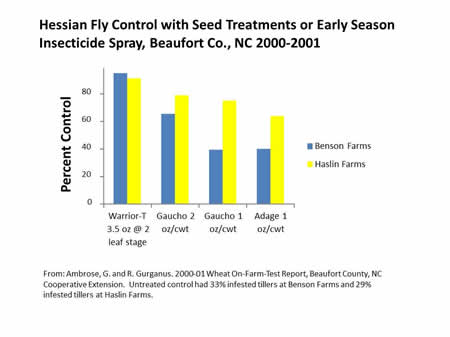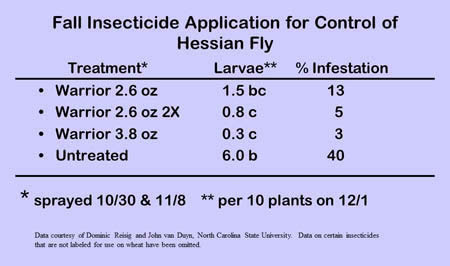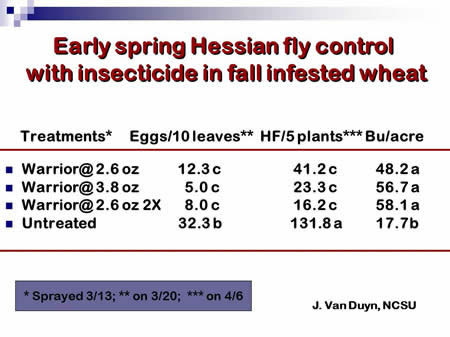
- Pictures of Hessian Fly
- Pictures of Hessian Fly Damaged Wheat
- Hessian Fly Biology and Life Cycle at Various Locations
- Effect of Hessian Fly on Wheat Yield
- Resistance of Wheat Varieties to Hessian Fly
- Effectiveness of Hessian Fly Resistance Genes
- Agronomic Practices That Affect Hessian Fly Populations
- Seed Treatments
- Foliar Insecticides
- Home
Foliar Insecticides for Hessian Fly Control
This page presents the results of experiments on foliar insecticides for control of Hessian fly in the Southeast.* For specific insecticide recommendations please see the Pest Management Guide for your state.
This study from Beaufort Co., NC, showed that a foliar application of insecticide at the two leaf stage (15 days after planting) controlled early season Hessian flies. Wheat was planted around October 20.

An additional study from North Carolina that shows the efficacy of this early season spray.

Foliar insecticide sprays can also be used in spring to rescue fields that are heaviliy infested with Hessian flies. At this time there may be less yield potential, because the plants have already been damaged.
slide courtesy David Buntin, University of Georgia
Additional information on use of insecticide seed treatments to control Hessian fly can be found at the following link: Use of Foliar Insecticides to Control Hessian flies in the Tidewater Region of North Carolina.
Data contributed by Matt Winslow and Ames Herbert, Virginia Polytechnic Institute and State University.
*Use pesticides only according to the directions on the label. Follow all directions, precautions, and restrictions that are listed. Do not use pesticides on plants that are not listed on the label. The pesticide rates in this publication are recommended only if they are registered with the Environmental Protection Agency and the appropriate regulatory agency for each state. If a registration is changed or cancelled, the rate listed here is no longer recommended. Before you apply any pesticide, check with your county Extension agent for the latest information. Trade names are used only to give specific information. The Alabama Cooperative Extension System and other authoring agencies do not endorse or guarantee any product and does not recommend one product instead of another that might be similar.

 Menu
Menu



